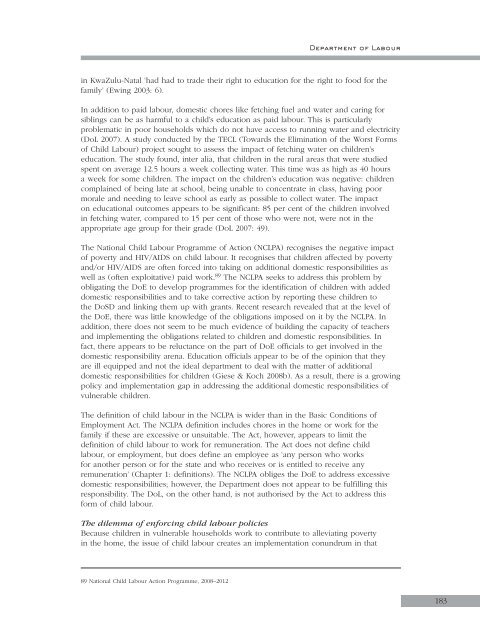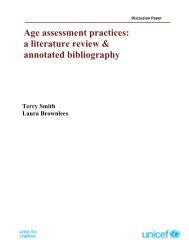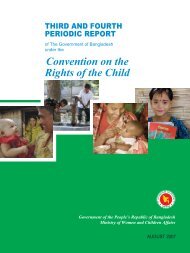Government-funded programmes and services for vulnerable - Unicef
Government-funded programmes and services for vulnerable - Unicef
Government-funded programmes and services for vulnerable - Unicef
Create successful ePaper yourself
Turn your PDF publications into a flip-book with our unique Google optimized e-Paper software.
Department of Labour<br />
in KwaZulu-Natal ‘had had to trade their right to education <strong>for</strong> the right to food <strong>for</strong> the<br />
family’ (Ewing 2003: 6).<br />
In addition to paid labour, domestic chores like fetching fuel <strong>and</strong> water <strong>and</strong> caring <strong>for</strong><br />
siblings can be as harmful to a child’s education as paid labour. This is particularly<br />
problematic in poor households which do not have access to running water <strong>and</strong> electricity<br />
(DoL 2007). A study conducted by the TECL (Towards the Elimination of the Worst Forms<br />
of Child Labour) project sought to assess the impact of fetching water on children’s<br />
education. The study found, inter alia, that children in the rural areas that were studied<br />
spent on average 12.5 hours a week collecting water. This time was as high as 40 hours<br />
a week <strong>for</strong> some children. The impact on the children’s education was negative: children<br />
complained of being late at school, being unable to concentrate in class, having poor<br />
morale <strong>and</strong> needing to leave school as early as possible to collect water. The impact<br />
on educational outcomes appears to be significant: 85 per cent of the children involved<br />
in fetching water, compared to 15 per cent of those who were not, were not in the<br />
appropriate age group <strong>for</strong> their grade (DoL 2007: 49).<br />
The National Child Labour Programme of Action (NCLPA) recognises the negative impact<br />
of poverty <strong>and</strong> HIV/AIDS on child labour. It recognises that children affected by poverty<br />
<strong>and</strong>/or HIV/AIDS are often <strong>for</strong>ced into taking on additional domestic responsibilities as<br />
well as (often exploitative) paid work. 89 The NCLPA seeks to address this problem by<br />
obligating the DoE to develop <strong>programmes</strong> <strong>for</strong> the identification of children with added<br />
domestic responsibilities <strong>and</strong> to take corrective action by reporting these children to<br />
the DoSD <strong>and</strong> linking them up with grants. Recent research revealed that at the level of<br />
the DoE, there was little knowledge of the obligations imposed on it by the NCLPA. In<br />
addition, there does not seem to be much evidence of building the capacity of teachers<br />
<strong>and</strong> implementing the obligations related to children <strong>and</strong> domestic responsibilities. In<br />
fact, there appears to be reluctance on the part of DoE officials to get involved in the<br />
domestic responsibility arena. Education officials appear to be of the opinion that they<br />
are ill equipped <strong>and</strong> not the ideal department to deal with the matter of additional<br />
domestic responsibilities <strong>for</strong> children (Giese & Koch 2008b). As a result, there is a growing<br />
policy <strong>and</strong> implementation gap in addressing the additional domestic responsibilities of<br />
<strong>vulnerable</strong> children.<br />
The definition of child labour in the NCLPA is wider than in the Basic Conditions of<br />
Employment Act. The NCLPA definition includes chores in the home or work <strong>for</strong> the<br />
family if these are excessive or unsuitable. The Act, however, appears to limit the<br />
definition of child labour to work <strong>for</strong> remuneration. The Act does not define child<br />
labour, or employment, but does define an employee as ‘any person who works<br />
<strong>for</strong> another person or <strong>for</strong> the state <strong>and</strong> who receives or is entitled to receive any<br />
remuneration’ (Chapter 1: definitions). The NCLPA obliges the DoE to address excessive<br />
domestic responsibilities; however, the Department does not appear to be fulfilling this<br />
responsibility. The DoL, on the other h<strong>and</strong>, is not authorised by the Act to address this<br />
<strong>for</strong>m of child labour.<br />
The dilemma of en<strong>for</strong>cing child labour policies<br />
Because children in <strong>vulnerable</strong> households work to contribute to alleviating poverty<br />
in the home, the issue of child labour creates an implementation conundrum in that<br />
89 National Child Labour Action Programme, 2008–2012<br />
183
















